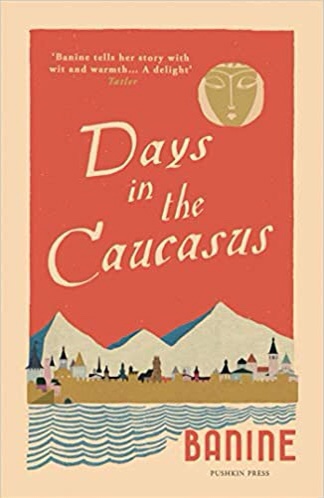
Translated from French by Anne Thompson-Ahmadova
It shows the paucity of my geographical knowledge, but I had never thought of Azerbaijan as a land of oil barons. After reading Banine’s memoir of her early life, AND referring more times than I care to admit to google maps during the read, I do now.
At least prior to the Russian Revolution and possibly for a few years afterwards. Don’t ask me to pinpoint dates. I probably could work them out based on the detail provided in Banine’s memoirs which cover the years from her birth (1905) until the year she left Azerbaijan (1923), but I wasn’t paying that much attention – I was too engrossed in her personal story.
“We all know families that are poor but ‘respectable’. Mine, in contrast, was extremely rich but not ‘respectable’ at all.” says Banine in the opening sentence, setting the tone of what is to come, and she does air quite a lot of dirty washing! Not enough to compete with the Ewings, the Dallas oil clan of the 1980s, but a darn sight more than you would expect of a muslim family in the first two decades of the C20th. Her family’s wealth came from her grandfather having struck black gold on his land in the C19th. Which led to a family feud between his two sons. Banine’s mother died of puerperal fever after her birth. Her father, busy attending his father’s growing business empire, was frequently away, leaving his daughters in the care of their grandmother and their German governess. This accorded his daughters (Banine had 3 older siblings) more licence that might otherwise have been expected.
When one sister ran away with someone totally unsuitable (but was retrieved) Banine began to understand that actions have consequences. But her close friend and cousin, the quite shameless Gulnar, taught her that life need not be constrained by accepted norms. So Banine (I think she is 14 at this point) allows herself to fall in love with the man who reminds her of Tolstoy’s Prince Andrey (her fantasy man). The thing is it’s 1920 by this time when the Bolsheviks had retaken Baku and Andrey Massarin (10 years her senior) was a Bolshevik. Although he was was entirely honourable in his intentions, Banine was too timorous to run off with him … so the married Gulnar did instead. (Although that is a spoiler of sorts, it’s not the final twist …)
So instead of eloping with her love, Banine allows herself to be married to a man she detests. Why? Emotional blackmail and the vagaries of history. Banine’s childhood was a time of political turmoil. War in 1914, occupation by the Turks, followed by the English. Communist occupation during which her family fled to Turkey. Return following social democratic victory in the elections of November 1918. But by 1920 it’s a matter of securing her father’s release from Russian imprisonment and obtaining the appropriate document to leave the country. The Bolsheviks you see weren’t exactly enamoured of former ministers of the Azerbaijani Democratic Republic.
The plan works, and when her father leaves for Paris, Banine finds her resentments growing. After all her sisters left years earlier, and she remains with her detested husband (20 years her senior). The final part of her memoir pertains to that time with Jamil before she joins her family in Paris. Not entirely without pleasure given that there was still money to squander – the Russians hadn’t requisitioned the jewels the rich had stashed away as they had other priorities. Yet Jamil was a gambler and in danger of losing it all before securing their own passes to Paris.
Well, we know Banine makes it, because she went on to become one of the literary set in Paris, publishing these vivid memoirs in 1946. At times her sanguinity is astonishing. Following her grandfather’s death, Banine becomes a multi-millionairess in her own right only to see her inheritance vanish a few days later when the Russians reentered Baku. The money didn’t matter. She had other concerns. “With my own eyes I had seen the end of a world,” she states calmly. She’s far more emotional, however, regarding her marriage. Banine spits out her loathing, and while I sympathised, I couldn’t help feeling sorry for the bewildered Jamil. There’s a trace of judgment from the older Banine towards her girlish self. “I didn’t know then how much I would change; So much so that as I now describe my former self, I feel neither compassion nor sympathy for her.”
I would be interested to know exactly how she means that. Perhaps the answer is found in her second memoir “Parisian Days”. Unfortunately that does not seem to be available in English.

Pushkin Press was founded in 1997. As the publisher which brought Stefan Zweig back to English readership, in those handsome and now iconic Pushkin Collection editions, they need no introduction to readers of this blog. They are the publisher with more shelf space in my library than any other (excepting the Folio Society). My first Pushkin Press review post featured Dying and Fräulein Else by Arthur Schnitzler in December 2007, and since then I’ve lost count of how often Pushkin Press have featured here. I now have 54 Pushkin Collection editions on the shelves … and an ever expanding collection of Pushkin Vertigos (their crime imprint). I don’t expect my collection to stop at that either! (Particularly should they publish Parisian Days. Hint, hint!)
Pushkin Press always does a good job of unearthing things you might never have heard of, as well as giving new life and translation to old favourites. I rather like the sound of this one!
Wow! This sounds amazing, and very much a book for me! Pushkin do find some gems and I hope the follow up makes it into English too!!
I bought this book last year when reading The Eighth Life I realised how little I know about that area. Thanks for the reminder and for a good review.